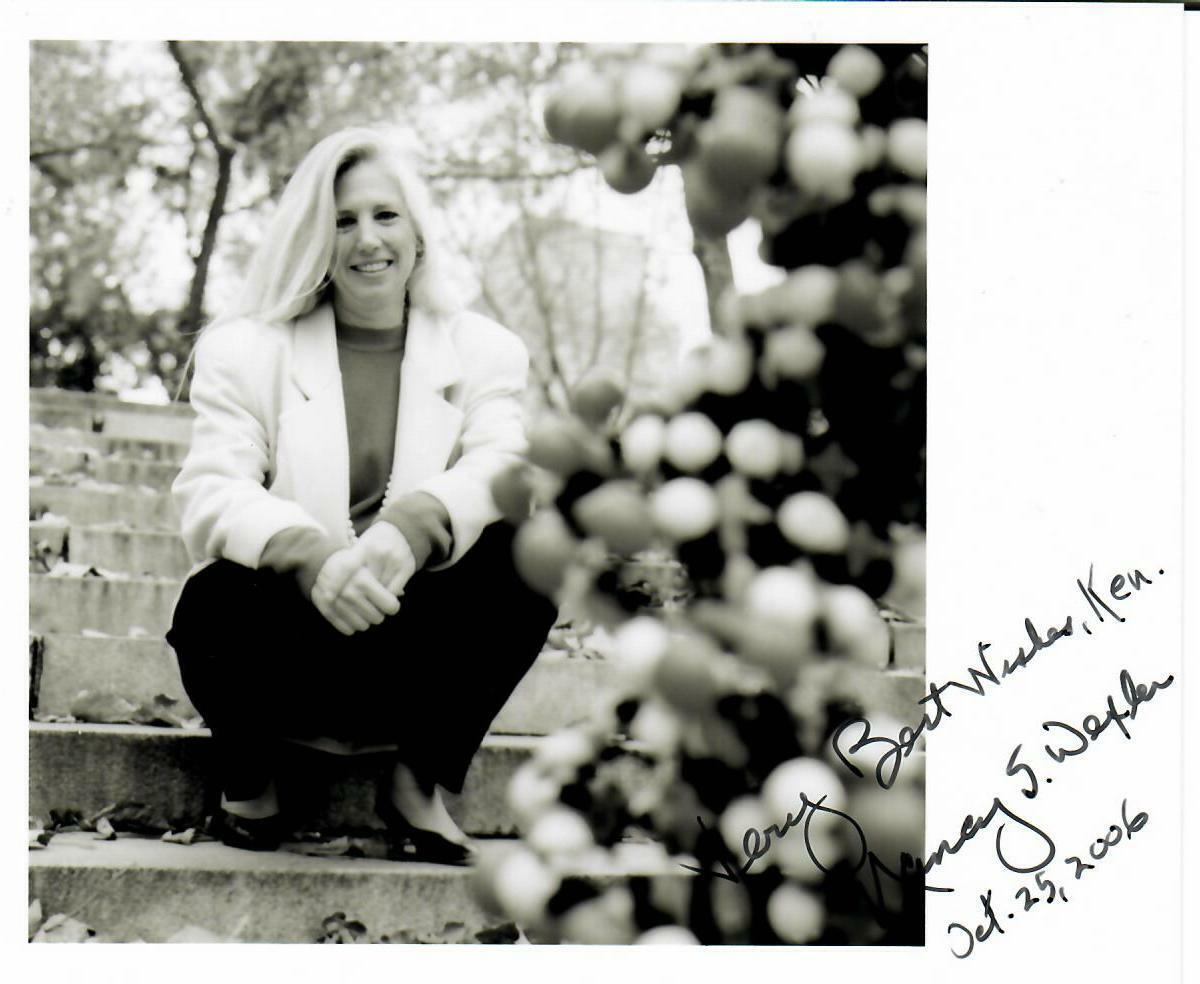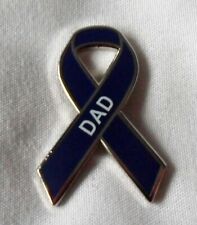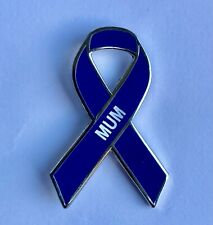"Huntington's Disease" Nancy Wexler Hand Signed 5X7 B&W Photo For Sale

When you click on links to various merchants on this site and make a purchase, this can result in this site earning a commission. Affiliate programs and affiliations include, but are not limited to, the eBay Partner Network.
"Huntington's Disease" Nancy Wexler Hand Signed 5X7 B&W Photo:
$199.99
Up for sale a RARE! "Huntington's Disease" Nancy Wexler Hand Signed 5X7 B&W Photo.
1945) FRCP is an
American geneticist and the Higgins Professor of Neuropsychology in
the Departments of Neurology and Psychiatry of the Columbia University College of Physicians and Surgeons, best
known for her involvement in the discovery of the location of the gene that
causes Huntington's disease. She
earned a Ph.D. in clinical psychology but instead chose to work in the
field of genetics. The daughter of a Huntington's patient, she led a research
team into a remote part of Venezuela where the disease is prevalent. She
visited the villages of Laguneta, San Luis, and Barranquitas. She obtained
samples of DNA (deoxyribonucleic acid) from a large family with a
majority of the members having Huntington's disease. The samples her team
collected were instrumental in allowing a global collaborative research group
to locate the gene that causes the disease. Wexler participated in the
successful effort to create a chromosomal test to identify carriers of
Huntington's disease. Nancy Wexler was born 19 July 1945, in Washington, D.C.,
and grew up in Pacific Palisades, California and Topeka, Kansas. Wexler's father, Dr. Milton Wexler, was a psychoanalyst and clinical psychologist,
and her mother was a geneticist who taught biology before her children were
born. Both parents taught the girls different areas of science, including the
environment, nature, physics, and astronomy. Wexler's grandfather died when her
mother, Leonore, was only 15 years old. Leonore looked up Huntington's disease (HD)
at the library and read that it was “a fatal, inherited disease only affecting
men.” Leonore's three brothers, Seymour, Paul, and Jesse Sabin, all
suffered from HD and died within four years of each other. The diagnosis was
kept a secret from the rest of the family for many years. The uncles were
called "nervous," instead of ill. When Leonore started showing
symptoms of HD, her then ex-husband, Milton, kept the diagnosis from her for
about a year. She still thought that HD only affected men. When they finally
told her she had HD, Nancy said, “Her mother did not protest. It seemed as if
Leonore, knowing her family history, had perhaps understood the truth all
along.” Wexler
thought at an early age she would want to know as much as possible about the
disease. Nancy Wexler attended many workshops including her own. She was most
impressed by the workshop of George Hunting which was a film showing Huntington
disease patients as a part of a community near Lake Maracaibo in comparison to
most U.S patients confined to nursing homes. Years later, Nancy became involved
in the Venezuela research.
From 1963, Wexler studied for her A.B. in psychology at Radcliffe
College, graduating in 1967. She then earned a PhD in clinical psychology from
the University of Michigan in 1974. While studying for her A.B. she was
required to take an introductory biology course, which constitutes "[her]
only formal education in biology. In 1968 her father started the Hereditary Disease
Foundation, which introduced her to scientists such as geneticists
and molecular biologists. Along with textbooks and lectures she attends, the
scientists "have really been [her] teachers since then." Nancy and Alice both became very involved in
the foundation and both became trustees. Nancy is now President of the
foundation. The group raises funds for research on HD and related inherited
diseases. They also sponsor interdisciplinary workshops for scientists who work
on HD and other genetic diseases. In 1976 the U.S. Congress formed the Commission for the Control of
Huntington's Disease, and as part of their work, Wexler and the team travelled
to Barranquitas and Lagunetas, two settlements on Lake Maracaibo, Venezuela, where villagers had a particularly
high occurrence of Huntington's. Starting in 1979, the team conducted a
twenty-year-long study in which they collected over 4,000 blood samples and
documented 18,000 different individuals to work out a common pedigree. The
discovery that the gene was on the tip of chromosome 4 led to the development of a test for the
disease. For her work, she has been awarded the Mary Woodard
Lasker Award for Public Service, the Benjamin
Franklin Medal in Life Science (2007), and honorary doctorates
from New York Medical College,
the University of Michigan, Bard College and Yale University. She is a fellow of the Hastings Center, an independent bioethics research
institution. Wexler's mother's symptoms progressed from fingers
moving constantly, to uncontrollable motions. Nancy explains, “When she sat,
her spasmodic body movements would propel her chair along the floor until it
reached a wall, her head would bang repeatedly against the wall. To keep her
from hurting herself at night, her bed was padded with lamb’s wool.” She
continued to lose weight; she needed to consume at least 5,000 calories a day
because of her unique metabolism. She died on Mother's Day, 1978.Wexler
continued her research of the HD disease and accredits her ambition and
motivation to her father, Milton Wexler; he and her sister Alice worked closely
with her for years until her father turned his work over to her and her
colleagues, feeling that science had become too complicated for him.
Wexler has held many public policy positions, including: Chair of the
Joint NIH/DOE Ethical, Legal and Social Issues Working Group of the National
Human Genome Research Institute; Chair of HUGO, the Human Genome Organization;
and member of the Institute of Medicine. She
has served on the American Association for the Advancement of Science board
of directors, and the advisory committee on Research on Women's Health, NIH. Her
sister, Alice Wexler is three years older, and has her PhD in History and also
contributed to the field of Huntington's. Nancy Wexler and the rest of the
Wexler family feature prominently in Alice's book, Mapping Fate -A
Memoir of Family, Risk, and Genetic Research that describes how
the Wexlers coped with an affected mother while simultaneously trying to
spearhead HD research. Alice Wexler is now working on a new book on the social
history of HD. In taking over the work of her father, Nancy Wexler met with
many issues and difficulties. The goal of Wexler's research was to continue the
work. The studies were done on maternal and fraternal parents with
Huntington's disease. For years the researchers used DNA to study DNA of
Huntington's disease patients. Nancy Wexler first encountered the idea of using
polymorphisms as markers in October 1979. She was hosting a workshop and
listened as key theorists explained their visions of gene hunting and was
struck with the idea. It was from her idea that James F. Gusella focused on finding HD markers. He
quickly hit upon the marker that would determine if a person had HD. Wexler
gave Gusella samples of blood that she had collected from people in Venezuela
and one after another, the samples confirmed the early finding. Huntington's
disease is one of several trinucleotide repeat
disorders which are caused by the length of a repeated section
of a gene exceeding a normal range. The HTT gene is located on the short arm of chromosome 4 at 4p16.3. HTT contains a sequence of
three DNA bases—cytosine-adenine-guanine (CAG)—repeated multiple
times (i.e. ... CAGCAGCAG ...), known as a trinucleotide repeat.] CAG is the genetic code for the amino acid glutamine, so a series of them results in the production of a
chain of glutamine known as a polyglutamine tract (or
polyQ tract), and the repeated part of the gene, the PolyQ region.

Related Items:
"Huntington's Disease" Nancy Wexler Hand Signed 5X7 B&W Photo
$139.99
Huntington's Disease ' DAD ' Awareness ribbon enamel badge / brooch.
$4.98
Huntington's Disease ' MUM ' Awareness ribbon enamel badge / brooch.
$4.98



